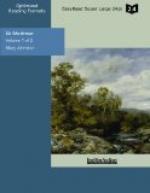“Wore you,” the Spaniard spoke slowly—“wore you black armor? Wore you in your helm a knot of rose-colored velvet?... Ah, it was you unhorsed me, then!”
“Again, senor, the fortune of war.”
A spasm distorted for the moment De Guardiola’s every feature. So often of late had chagrin been pressed to his lips that the cup had grown poisonous. When he spoke it was with a hollow voice: “Had not Mexia come in between us!... The light caught the velvet knot upon your helm and it flamed like a star. I, Luiz de Guardiola, lying at your feet, looked up and saw it blaze above me like an evil star!” His hand fell heavily upon the table. “The star may fall, Englishman!”
“The helm that bore the star may decline to earth,” answered Ferne. “The star is fixed—beyond thy snatching, Spaniard!”
Thrust in Mexia, leaving El Dorado for the present less gilded plight of the Spanish: “Fifty thousand ducats! Holy Virgin! Are we Incas of Peru—Atahualpas who can fill a hall with gold? Now, twenty thousand—”
“I will not pay one peso,” said De Guardiola. His voice, low and vibrant, was as a warder thrown down. On the instant, all the length of the table, the hurried speech, the growing excitement, the interchange of taunt and bravado, ceased, and men leaned forward, waiting. The silence was remarkable. Down in the square was heard the sentinel’s tread; from a bough that drooped against the wall a globe of vegetable gold fell with the noise of stone-shot.
“Raze every house in Nueva Cordoba,” went on the Spaniard, “play the earthquake and the wave—then sail away, sail away, marauders! and leave the fortress virgin, and the treasure no lighter by one piece, and Luiz de Guardiola to find a day when English dogs shall cringe before him!”
He had risen from his place, and at that movement sprang also to their feet his ten cavaliers. At once arose a tumult that might have resulted in the severance of the truce with sharp steel had not the leaders of the several parties stayed with lifted arm and stern command that threatened disgrace. At last was compelled a stillness sinister as that of the air before a storm.
“I bid our guests good night,” said the Admiral. “Our enemies we shall meet again. I think that so slight a ransom will not now content us. As you ride through the streets of Nueva Cordoba look your last, senors, upon her goodly houses and pleasant places.”
“Do thy worst!” answered De Guardiola, grinning like a death’s-head.
Mexia wiped the sweat from his brow.
“Let us go—let us go, Don Luiz! I stifle here. There’s a strangeness in the air—my heart beats to bursting! Holy Teresa, give that the wine was not poisoned!”




